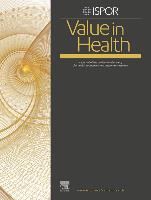Key Recommendations From ISPOR Special Interest Group
 Lawrenceville, NJ, USA—August 30, 2022—Value in Health, the official journal of ISPOR—The Professional Society for Health Economics and Outcomes Research, announced today the publication of a new report examining 4 umbrella terms—digital health, eHealth, mHealth, and telehealth/telemedicine—and their associated definitions from the perspective of their applicability for outcomes research. The report, “How Useful Are Digital Health Terms for Outcomes Research? An ISPOR Special Interest Group Report,” will be published in the September 2022 issue of Value in Health.
Lawrenceville, NJ, USA—August 30, 2022—Value in Health, the official journal of ISPOR—The Professional Society for Health Economics and Outcomes Research, announced today the publication of a new report examining 4 umbrella terms—digital health, eHealth, mHealth, and telehealth/telemedicine—and their associated definitions from the perspective of their applicability for outcomes research. The report, “How Useful Are Digital Health Terms for Outcomes Research? An ISPOR Special Interest Group Report,” will be published in the September 2022 issue of Value in Health.
“The COVID pandemic has accelerated the utilization of digital health broadly and telehealth/telemedicine in particular,” said author Anita Burrell, MA, MBA. “And while there is a general enthusiasm to embrace and reimburse digital technologies, there is still confusion over the terms used. Sometimes they are used interchangeably, and even a single term may have multiple definitions. Without clear definitions, what should be included in an evidence summary of a particular health technology may vary, thus hindering the design or interpretation of comparative effectiveness research and ultimately, decision making.”
To better understand the current terminology, the ISPOR Digital Health Special Interest Group undertook a scoping review of digital health definitions used in outcomes research literature and in practice. The authors identified 142 unique definitions of umbrella terms: digital health (4); eHealth (36); mHealth (50); and telehealth/telemedicine (52). Overall, digital health and eHealth could be considered to be the broadest and equivalent terms. Telehealth is a subterm that includes telemedicine and mHealth, which overlap when mobile devices are used for telemedicine.
Importantly, an abundance of new definitions have been developed over time. Even after applying text analyses, the definitions of these 4 umbrella terms are too general and do not specify the functional domains of interventions or outcomes that the respective technologies deliver to patients.
Looking forward, the authors suggest that for evidence reviews, an umbrella term should be accompanied by search terms that specify the patient population and clinical condition, intervention, comparator, outcomes, timing, and healthcare setting of interest. An international classification system for digital health technologies with categories related to domains of function, effect, and patient outcomes is needed to establish a standard terminology for stakeholders involved in the development, use, and assessment of such technologies.
“Our study found an overlap between the concepts included in definitions of digital health-related umbrella terms, leaving ambiguity about the functional domains of digital health,” said Burrell. We believe that the rapid pace of digitalization requires a bold move to produce a framework that can lead to more focused, accurate, and efficient assessments of these technologies, allowing effective digital health interventions to be funded and thus realizing the benefits of digital health.”
This report is an important contribution to an increasingly significant topic in healthcare around the world. For more information on ISPOR Digital Health activities, visit ISPOR’s Digital Health Special Interest Group webpage.
###
ABOUT ISPOR
ISPOR, the professional society for health economics and outcomes research (HEOR), is an international, multistakeholder, nonprofit dedicated to advancing HEOR excellence to improve decision making for health globally. The Society is the leading source for scientific conferences, peer-reviewed and MEDLINE®-indexed publications, good practices guidance, education, collaboration, and tools/resources in the field.
Website | LinkedIn | Twitter (@ispororg) | YouTube | Facebook | Instagram
ABOUT VALUE IN HEALTH
Value in Health (ISSN 1098-3015) is an international, indexed journal that publishes original research and health policy articles that advance the field of health economics and outcomes research to help healthcare leaders make evidence-based decisions. The journal’s 2021 impact factor score is 5.101 and its 5-year impact factor score is 6.747. Value in Health is ranked 5th of 87 journals in health policy and services, 7th of 102 journals in healthcare sciences and services, and 19th of 371 journals in economics. Value in Health is a monthly publication that circulates to more than 10,000 readers around the world.
Website | Twitter (@isporjournals)